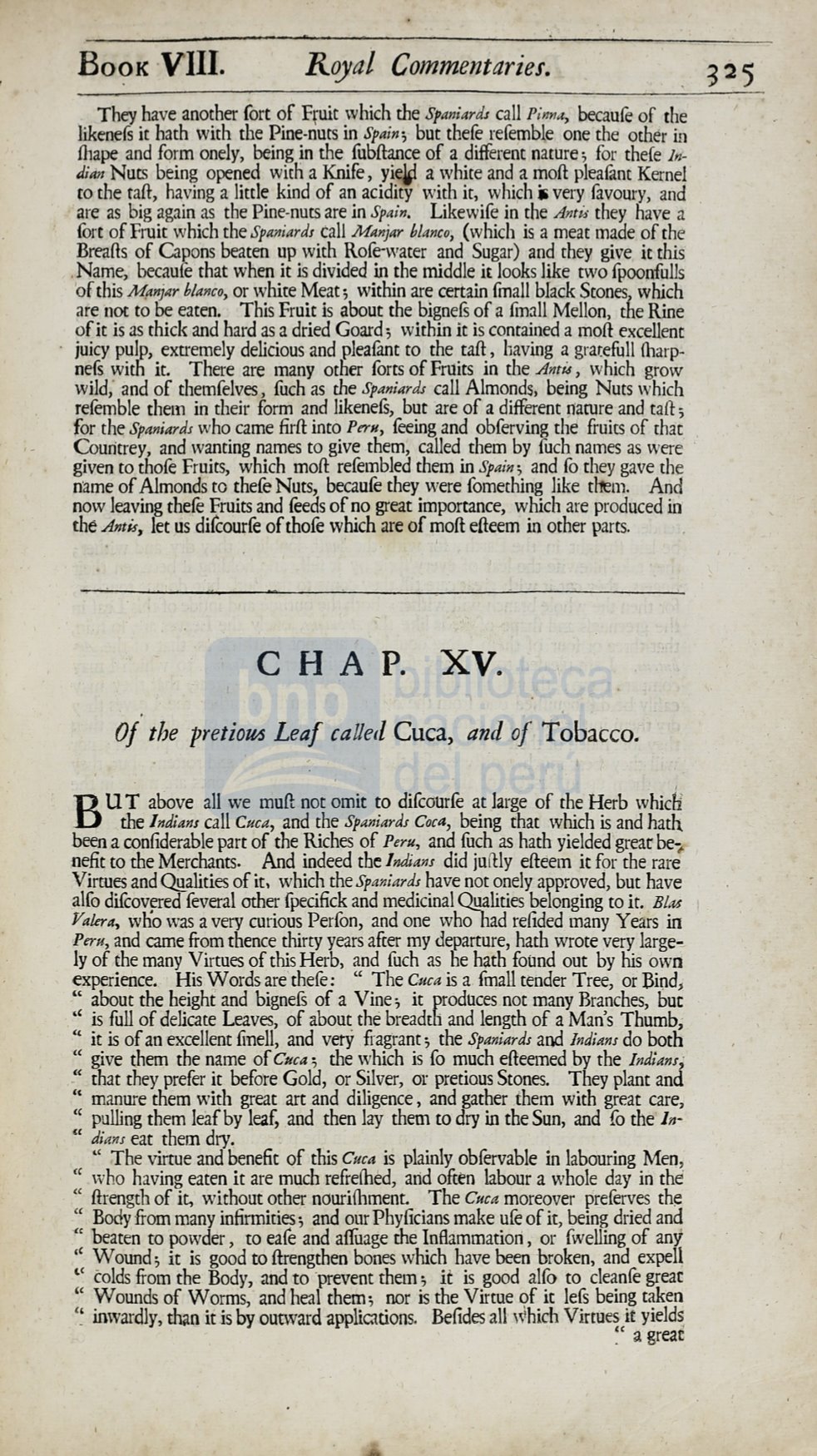

BooK ·VUI.
R.oyal
Commentaries.
They have another fort of Ftuit which the
Spaniard1
cal!
Pinna,
becaufe of che
liken.efs it hath wich the Pine-nuts in
Spain;·
but thefe refernble one .the othér in
íhape and fqrrn onely, ooing in the fubíl:ance
of
a different nature; for chefe
Jri.
dian
Nuts being opened with a Knife,
yieJp
a whice and a moíl: pleafanc Kernel ·
ro che raft, having a little kind of an acidity with ir, whi~h
~
very favoury, and
are as big again as che Pine-nucs are in
Spain.
Likewife in che
Antú
they have a
fort of Fruir which che
Spaniards
éall
Manjar blanco,
(
which is a meaemade of che
Breaíls of Capons beacen up wich Rofe·wacer and Sugar) and chey give itthis'
.Name, becaufe chat when it is divided
in
che middle it looks like cwo fpoonfolls
'ofthis
M_anjar blanco,
or whice Meat; within are certain fmall
bfa.ckScones, which
are not to be eaten. This Fruit is about che bignefs of a finall Mellan, che Rine
ofit is as rhick and hard as a dried Goard; within
it
is conrained a moíl: excellenc
juicy pulp, excremely delicious and pleafant to che taíl:, having a gratefull íha-rp–
nefs witn it. There are many ocner forts of Fruits in che
Anti&,
which grow
wHd; and of chemfelves, fuch as che
Spaniards
call Almonds, being Nuts which
refemble chem in cheir form and likenefs, bur are of a different p¡icure and caíl:;
for che
Spaniards
who carne firíl: inco
PerH,
feeing and obferving che fniits of thác .
Couritrey, and wanting names
to
give them, cal)ed chem by fuch names as were ·
given to chofe Fruits, which moíl: refembled chem in
Spain;
and fo.chey gave the
name ofAlmonds to thefe Nucs, becaufe they were fomeching Iike tl-tem. And
now leaving thefe Fruits and feeds ofno great importance, which are produced in·
the
Antú,.
lec us difcourfe ofthofe which are of ~oft efieem in other pares.
.
XV.
o/
the pretio1U Lea[ catled
Cuca,
and of
Tobatco:
B.
U
T
above ali we rnuíl: not ~rnit to difcourfe at Iarge ~f the l-Ierb whicH
the
lndians
cal!
Cuca,
and che
Spaniards Coca,
being thac which
is
and hath,
been a confiderable part of the Riches of
Peru,
and fuch as hath yielded grear be~
-nefit to che Merchancs. And indeed che
Indians
did juíl:ly eíl:eem it for che rare
Virmes and Qg_alities of it, which the
Spaniards
have not onely approved, but have
alfo difcovered feveral other fpecifick and medicinal Q!alities belonging
to
it.
BIM
Valen,,
wlío was avery curious Perfon, and one who had refided many Years in
Peru,
and carne from thence thirty years afcer my departure, hath wrote :very large.._
ly
of ~he rnany Virtues of this Herb, and fuch as ne h¡¡th fotmd out by his own
experiepce. His Words are·ch.efe: " The
Cuca
is a.fmall tender Tree, or Bind:i
" ~bout che h~ighi and bignefs of a Vine; it produces not many Bra,nches, bue
·. '' 1s full of dehcate Leaves, of about the breadth and length of a Man s Thurnb;
'' it
is
ofan excellent finell, and vety fragrant; the
$paniards
and
India.nsdo both
" give thern the name of
Cuca;
the which is fo much eíleemed by the
Jndians;
.«
rhat chey prefer ic befote Gold, or Silver,
01·
pretious Stones. They plam and
" manure them with great art and diligence , and gather .them wich great care,
" pulling them leaf by leaf, .and then lay them
to
dry
in
the Sun, and
fo
che
In-
"
dians
eac rhem dry.
.
«
Tbe virtue and benefic of this
Cuca
is plainly obfervable in labouring Men,
" who having eaten it are mgch refreíhéd, arid ofcen labour a whole day in che
" íl:rengcb of it, without other nourifhment. The
Cuca
rnoreover preferves th~
" Body from man
y
infirrnicies; and our Phyíicians make ufe of it, being dried and
" beaten
to
powder,
to
ea(e and aífuage the Inflammatiori, or fwelling of any
'' Wound; it is good to íl:rengthen bones which have been -broken, and expel\
'' colds from the Body, and to ·prevent them;
it
is good alfo to cleanfe greac
'' Wounds of Worrns, and hea1l chem; nor is che Vim;ie of it lefs being taken
'~ inwardly, than itís by .outward-applications. Befides all .\~hich Virtues
it
yield~
:' a
greac














